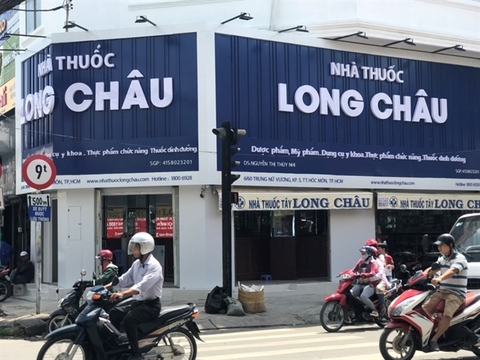
A Long Chau drugstore. The pharmaceutical retail market was seeing the rapid expansion of modern drugstore chains. — Photo FPT Retail
The winds of change are blowing through Viet Nam’s retail pharmaceutical industry, with giants wrapping up investments to establish modern retail chains in an anticipated fast-growing market, which mom-and-pop stores currently dominate.
After Pharmacity, FPT’s Long Chau, and Mobile World Investment Corp’s An Khang pharmacy chains, Masan Group is supposedly gearing up preparations to enter the pharmaceutical retail market.
According to the national portal about business registration, Winphar Trading Services Corporation was founded on March 31 with WinCommerce, holding a stake of 80 per cent, Do Thi Hoang Yen and Tran Phuong Bac, 10 per cent each.
WinCommerce, a member of Masan Group, currently operates the most significant nationwide grocery modern trade retail platform Winmart and Winmart+ while Yen and Bac both held important positions at Masan.
Winphar changed its name to Dr Win Corporation on July 1 with a charter capital of VND28.57 billion.
At the end of 2021, Masan launched the multi-experience store CVLife, where customers could buy necessities at WinMart+, make financial transactions at Techcombank, buy medicine and supplements at Phano Pharmacy and enjoy famous Phuc Long Tea. This combination triggered doubts about the participation of Masan in the multi-billion-dollar pharmaceutical retail market.
Phano now has around 40 stores across the country, still modest compared to Pharmacity with 1,128, Long Chau with 706 and An Khang with 520 stores.
The competition in the pharmaceutical retail market was anticipated to intensify as players were racing to expand their reach.
Chris Black, CEO of Pharmacity, said that the company targeted 5,000 stores by 2025 and 10,000 by 2030, which would allow half of Viet Nam’s population to reach a Pharmacity store within 10 minutes of driving.
Khang Pharma targeted 800 stores by the end of 2022 and 2,000 by 2023.
According to SSI Research, with ambitious expansion plans of the three leading drugstore chains, Pharmacity, An Khang and Long Chau. The share of modern drugstores would increase to 16 per cent with 7,300 stores.
Doan Van Hieu Em, CEO of An Khang Pharma, said that it’s a good time for expansion as people were paying more attention to health after the pandemic.
Viet Nam’s retail pharmacy market was estimated at around $7-8 billion and forecast to register two-digit growth in the coming years.
Hospitals remain an important channel, an overwhelming majority of the market, while traditional stores, mostly mom-and-pop shops, accounted for one-third with around 60,000 stores.
Modern drugstores still account for a modest share, with nearly 3,000 stores. In 2016, modern drugstores held a share of just one per cent with 186 stores.
Inflation bites
Retail giants were eyeing the retail pharmacy industry, which is considered to have high growth potential given the people’s increasing attention to health after the pandemic and the country’s rapidly ageing population, while inflation has forced people to tighten spending on unnecessary goods from the second quarter of this year.
SSI Research pointed out that profits in information and communications technology (ICT) and consumer electronics (CE) for leading retailers were slowing down significantly,
Digiworld announced the second quarter profit increased by 20 per cent against the same period last year, much lower than the growth of 97 per cent in the first quarter. The ICT and CE revenue of Mobile World in May increased by two per cent, much lower than the growth of 20-22 per cent in January-April.
ICT and CE revenue was forecast to slow down in 2023 due to the high percentage of people owning mobile phones and major home appliances.
SSI Research said that the pharmaceutical business was less affected by high inflation while the input costs were more stable than other industries.
The pharmaceutical market also has good potential as the population is ageing rapidly in Viet Nam.
According to the United Nations Population Fund, Viet Nam was one of the most rapidly ageing countries in the world. People aged 60 and older made up 11.9 per cent of the total population in 2019, and by 2050, it would rise to more than 25 per cent. By 2036, Viet Nam would transition from an “ageing” to an “aged” society.
Besides, the middle class in Viet Nam was predicted to increase strongly in the next 10-20 years.
The World Data Lab forecast that Viet Nam would have an additional 23.2 million people joining the middle class in the next decade.
The World Bank predicted that more than 50 per cent of Viet Nam’s population, equivalent to 52 million people, would be in the middle class by 2045. — VNS